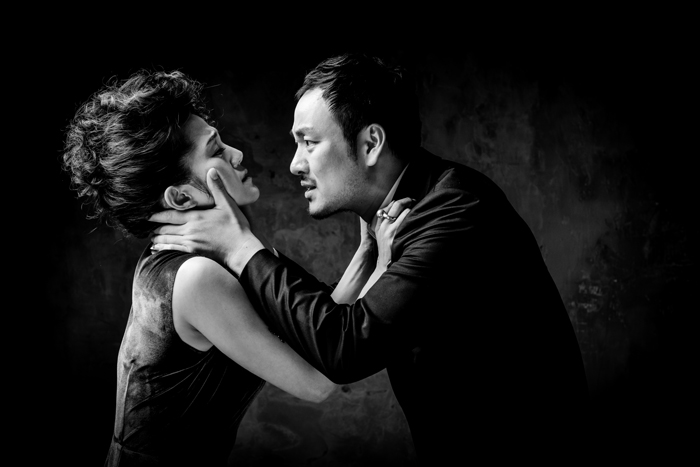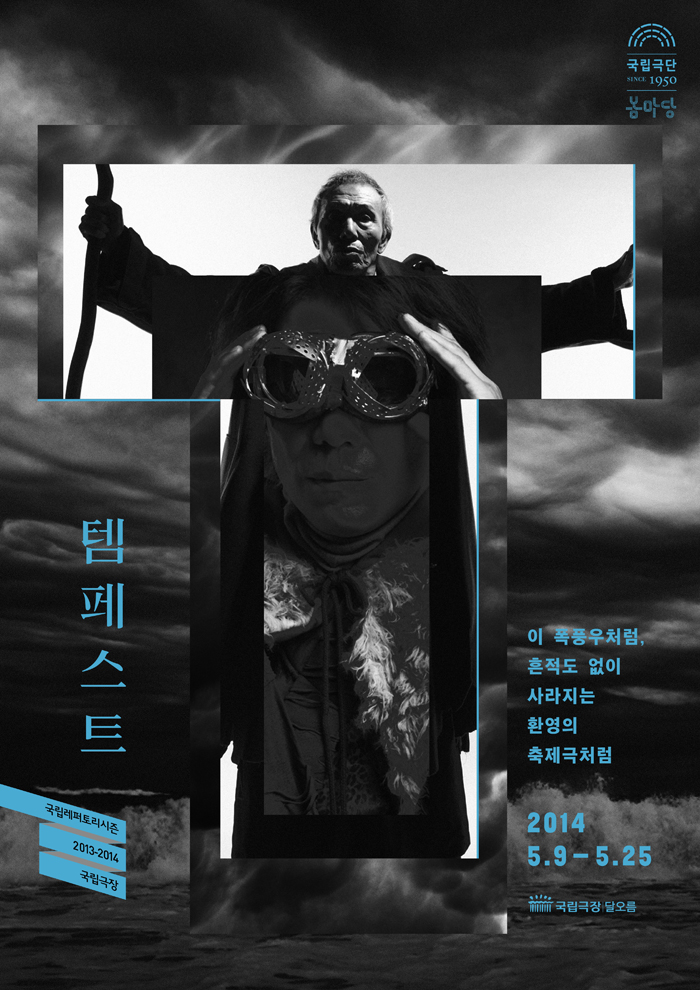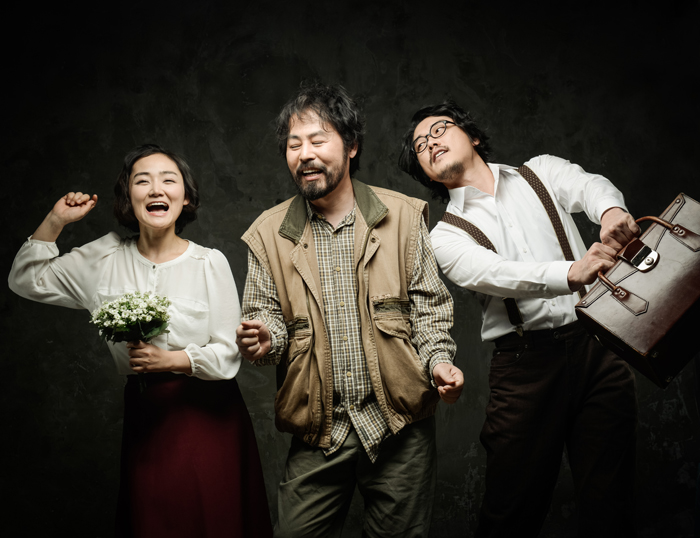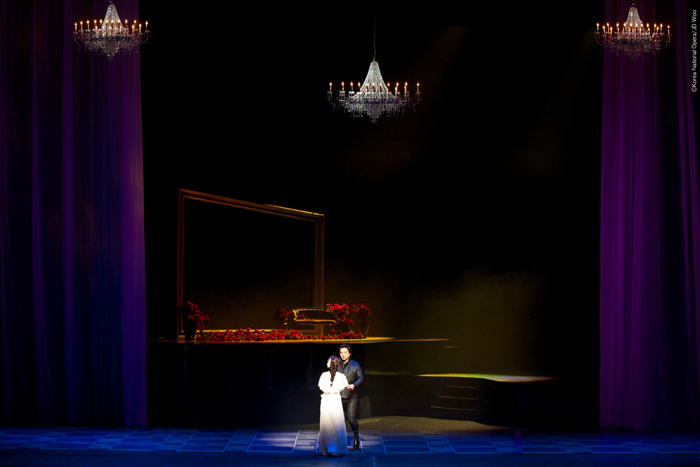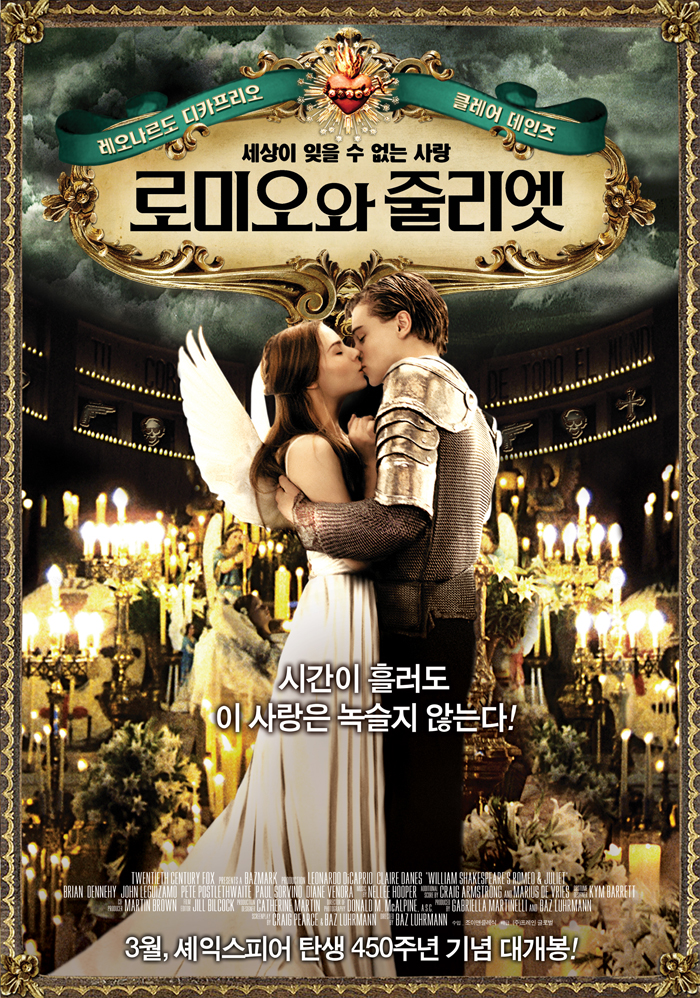The Bard at 450: new wave of Shakespeare hits Korea in 2014
In celebration of the 450th anniversary of Shakespeare’s birth, a series of performances, from play and opera to film and musical, are scheduled throughout the year and across Korea. Due to the penetrative insight contained in his works, many people have sympathized with his characters, regardless of time, space, society and age. The conflicts between good and evil and clashes between the expressed desires in his plays can still be reinterpreted and seem appropriate for the contemporary world.
(Top) A scene from “Macbeth,” being staged by the National Theatre Company of Korea (NTCK); (middle) the poster for “The Tempest;” and,
“Singing Shylock,” a reinterpretation of “The Merchant of Venice.” (photos courtesy of the NTCK)
The National Theater Company of Korea (NTCK) is staging “Macbeth,” which is considered one of the most powerful and poetic tragedies authored by Shakespeare, at the Myeongdong Theater in Seoul this month. The NTCK will also present “Singing Shylock,” based on an adaptation of the comedy “The Merchant of Venice,” at the Small Hall Dal of the National Theatre of Korea (NTOK, www.ntok.go.kr/english) in April. The play departs from a black-and-white interpretation of the main character, Shylock, while keeping the basic storyline of the original. In May, the NTCK plans to stage “The Tempest,” a masterpiece comedy completed in Shakespeare’s late period. The play is about the betrayal and revenge committed by brothers, as well as accidental encounters and love.
Another Shakespeare tragedy, “Julius Caesar” is scheduled at the Myeongdong Theater in late May. The play is about the Roman general and statesman Caesar and is known for the famous line, “Even You, Brutus.”
There are also operas. The Korea National Opera (KNO) will present Giuseppe Verdi’s opera “Othello” and Charles-François Gounod’s “Romeo and Juliet” at the Seoul Arts Center in southern Seoul in October and November, respectively. “Romeo and Juliet” features lyrical and graceful melodies that will resonate in the background of the tragic love story. The opera version of “Othello,” another great tragedy, comprises of magnificent musical scores.
The musical “Ophelia” is an adaptation of the tragedy “Hamlet.” It is a reinterpretation from the point of view of the tragic heroine Ophelia. It will be staged at the Sejong M Theatre in downtown Seoul in May.
“Romeo and Juliet” (top) and “Othello” will be staged by the Korea National Opera. (photo courtesy of the KNO)
There is also an invitational performance by a visiting theater company. The National Theatre of Korea will present “A Midsummer Night’s Dream” by the Bristol Old Vic Theatre of Britain at its Small Theater Dal in April. The new version of the play premiered in Britain last year and the British daily The Guardian described the piece as being “magical” and having “mystique.” The theater company is staging the play across the world, starting at the Barbican Centre in London in February, and will have its last performance in Seoul.
The 1996 film “Romeo + Juliet” by director Baz Luhrmann, featuring heartthrobs Leonardo DiCaprio and Clair Danes, will be released again in Korea on March 27. The original was reinterpreted and developed into a modern teen movie, although it kept the story and script. The two families at odds were changed to two rival companies and rock’nroll was added. It is also very much different from the classic 1968 Franco Zeffirelli “Romeo and Juliet,” which featured legendary actress Olivia Hussey and was known for its sentimentalism and beautiful melodies.
As seen in the rush of performances, Shakespeare is still alive, at least in theaters, musicals and operas. It is not an exaggeration to say that there isn’t a single day that goes by without at least one adaptation of his works being staged somewhere in the world. Another reason that Shakespeare’s works are continually on stage is that his scripts are considered textbooks for plays, featuring nearly perfect plotlines that express inner conflict, as seen with the interaction of different characters.
“The more I read Shakespeare, the more I discover,” said Seok Seong-ye, who directed the play “A Story of Two Soldiers,” a reinterpretation of “Hamlet,” in February earlier this year.
Yang Jung-ung, who directed “Romeo and Juliet,” a reinterpretation of the original, at Sogang University Mary Hall Theater in February, called Shakespeare the, “soul and heart of theater people,” while Lee Byung-hoon, the director of “Macbeth” staged by the National Theater Company of Korea, called Shakespeare’s work, “a bible of plays.”
“People live in the contemporary world, surrounded by uncertainties, and are often destroyed by unknowingly being trapped in a downward spiral,” Lee said. ”I wanted to show that the world we see is different from the world we live in.”
Kim Yun-cheol, artistic director at the NTCK, said that Shakespeare will be the keyword in theaters around the country until the year 2016, the 400th anniversary of his death, and that the NTCK will continue to present Shakespeare’s works over the next three years.
“Shakespeare’s plays were written five centuries ago, but they can be adapted and staged in contemporary theaters in any countries across the world. This makes them very special,” Kim said. “Shakespeare’s works contain mysteriousness, the ambiguity of life and irrational situations imbedded with despair, all popular subjects for contemporary art, and his works are relevant to today’s world. In 2016, the 400th anniversary of his death, we will include even more Shakespeare in our repertoire.”
By Limb Jae-un
Korea.net Staff Writer
jun2@korea.kr

